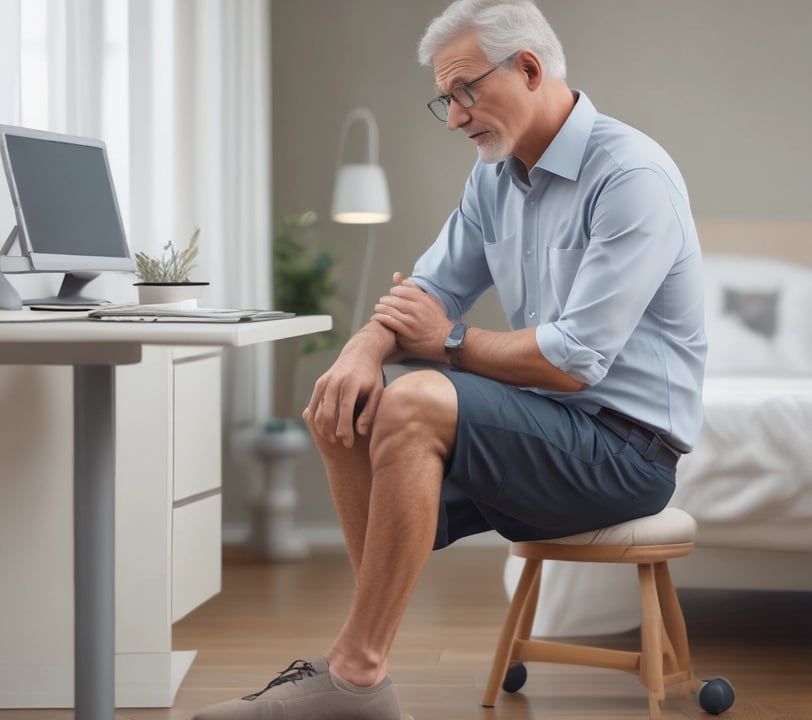When Should You See an Orthopaedic Surgeon?
Many people live with joint, bone, or muscle pain, assuming it will go away on its own. But some symptoms are not meant to be ignored. In fact, the sooner you consult an orthopaedic specialist, the easier it becomes to treat the problem — and avoid long-term complications.
Dr Dhanraz Gopal
5/28/20252 min read


6 Signs You Shouldn’t Ignore – by Dr. Dhanraz Gopal, Orthopaedic Surgeon in Mauritius
1. Persistent Joint Pain
Pain that lasts for more than 2–3 weeks, even after rest or medication, is a red flag. This could affect:
Knees
Hips
Shoulders
Spine (neck or lower back)
Pain may be inflammatory (at night or at rest) or mechanical (during movement or effort). Either way, it requires proper evaluation.
2. Loss of Mobility or Stiffness
If you're finding it harder to bend your knee, raise your arm, or climb stairs, you may be experiencing joint stiffness or damage.
Reduced range of motion is often caused by arthritis, ligament injuries, or tendon problems. Early consultation helps prevent worsening — and treatment can often remain non-surgical.
3. Clicking, Locking, or Joint Instability
Do you hear unusual clicking sounds? Does your joint suddenly lock or give way? This may indicate:
Meniscus tears
Cartilage damage
Ligament rupture (e.g., ACL)
Loose bone fragments
These symptoms are common after sports injuries or trauma, and often require imaging and specialist evaluation.
4. Numbness, Tingling, or Weakness in the Hands
These can be symptoms of carpal tunnel syndrome, nerve entrapment, or early rheumatoid arthritis.
Orthopaedic surgeons are trained to treat nerve compression and tendon-related issues in the hand and wrist. Delaying treatment may lead to permanent damage.
5. Visible Deformities or Asymmetry
If you notice a change in alignment, such as bow-legs, spinal curvature, or finger deformity — it's time to see a specialist.
These may result from scoliosis, advanced arthritis, post-injury deformities, or congenital conditions. The earlier it's treated, the better the outcome.
6. Pain After an Old Injury or Fracture
If you’ve had an injury in the past and are now experiencing:
Chronic pain
Weakness
Loss of function
Joint instability
…you may need reconstructive orthopaedic care. Dr. Gopal is also specialized in post-trauma corrective surgery, helping patients return to full mobility after old injuries.
Why See an Orthopaedic Surgeon?
Contrary to popular belief, an orthopaedic surgeon doesn’t always recommend surgery. Their first goal is to:
✅ Identify the exact cause of pain or dysfunction
✅ Recommend targeted tests (X-ray, MRI, etc.)
✅ Propose a personalized treatment plan — physical therapy, injections, braces, or surgery only if needed
✅ Support your recovery from diagnosis to rehabilitation
Dr. Dhanraz Gopal: Trusted Orthopaedic Surgeon in Mauritius
With over 30 years of experience, trained in various institutions, Dr. Gopal is an expert in:
Joint replacements (hip, knee, shoulder)
Spine surgery and scoliosis treatment
Sports injuries
Hand and wrist surgery
Post-trauma reconstruction
Known for his clear explanations and ethical approach, he guides patients with care and honesty.
Where to Book an Appointment
📍 Consult Dr. Gopal at Clinique Bon Pasteur (Rose Hill), Artemis Curepipe Hospital, Royal Green Hospital (Moka), Premium Care Clinic (Vacoas-Phoenix)
📞 Consultations by appointment by Whatsapp here
You don’t need to live with chronic pain or uncertainty.
If your body is telling you something is wrong, listen to it — and get expert advice from one of Mauritius' most trusted orthopaedic surgeons.

